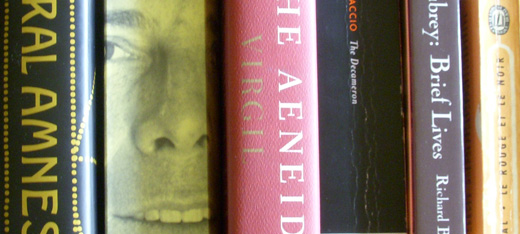Tuesday Morning Read
I did a bit of counting yesterday: I had fifteen more stories in the Decameron, and eighteen brief lives in Clive James’s Cultural Amnesia. In three to five weeks, then, only two of the six books in the photo will remain unread — and I have no intention of reading all of James Merrill at one go. The new lineup (which will probably take me until Spring ’09) will include Moby-Dick, Don Quixote, and The Anatomy of Melancholy. The “French novel” slot will be filled by Georges Bernanos’s Journal d’un curé de campagne.
“Are you crazy?” I asked myself, about the combination of Melville and Cervantes. But it’s not a combination so much as a juxtaposition. The two epics share the same basic story.
Â
¶ In the Decameron (IX, vi), the tale of the three beds that Chaucer recycled as “The Reeve’s Tale.” The story is just a tad too comic to be taken as a literal representation of medieval crowding; if the bedroom (with its three beds!) were so small, how could Pinuccio and the cottager’s daughter enjoy their frolic without disturbing the others — not to mention the cottager’s wife, who only thinks that she’s in bed with her husband.
¶ In Aubrey: Marten, Martin, Marvell, May, Mercator. Aubrey’s tastes for bric-à -brac and gossip not only meet but conjugate:
Memorandum: Mr Nicholas Mercator made and presented to King Charles II a clock (’twas of a foot diameter) which showed the inequality of the sun’s motion from the apparent motion, which the King did understand by his informations, and did commend it, but he never had a penny of him for it.
Well! This curious clock was neglected, and somebody of the court happened to become master of it, who understood it not; he sold it to Mr Knibb, a watch-maker, who did not understand it neither, who sold it to Mr Fromanteel (that made it) for £5 who asks no (1683) for it £200.
What goes around keeps ticking.
¶ In Merrill, wandering through A Gathering of Salts, the 1995 (and final) collection. Something tells me that the following response to disaster, in “Scrapping the Compujter,” was recollected in tranquillity:
Until that morning when a faint mechanical shriek
Took me a back. As I watched, the paragraph
Then under way deconstructed itself into
Mathematical symbols, musical notation —
Ophelia’s mad scene in a Czech production
Fifty years hence. The patient left on a gurney,
Returned with a new chip, the following week.
Everything but the shriek is composed.
¶ Clive James on Jean Cocteau — very unlikely bedfellows. This is the earnest heterosexual’s complaint about homosexual mincing (a complaint that has nothing to do with carnality but that may touch on something more important to the gay man; I don’t know):
Endlessly pirouetting to get himself into profile, Cocteau was tiresome in the extreme, but mainly because the froth and fizz of his superficial behavior made you nostalgic for the underlying man, whom you guessed correctly to be classical in his perceptions despite his self-denigrating mania for originality.
What James says next is as provocatively amusing as anything I’ve ever read:
It could be said that anyone who admired the looks of Jean Marais, the rebarbative star of both Orphée and La Belle et le bête, had the same classical perceptions as a Las Vegas hotel designer, but the late 1940s were a long time ago, and Marais’s bouffant hairstyle was the first ever seen in a serious context. Elvis Presley was not yet there to be copied.
Finally, the complaint is reprised:
Cocteau thought of his own images. He really was as innovative as his admirers said. Their only mistake was to imagine that novelty was an ethos.
Argument joined: many gay men would say that novelty not only is an ethos, but that in this vale of tears it is the only ethos.

